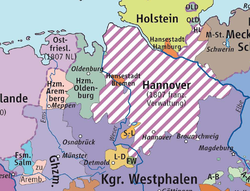Arenberg
| County (Duchy) of Arenberg | ||||||||||||||||
| Grafschaft (Herzogtum) Arenberg | ||||||||||||||||
|
State of the Holy Roman Empire, then State of the Confederation of the Rhine |
||||||||||||||||
|
||||||||||||||||
|
||||||||||||||||
|
The Duchy of Arenberg in 1807.
|
||||||||||||||||
| Capital | Aremberg | |||||||||||||||
| Languages | Moselle Franconian | |||||||||||||||
| Government | Principality | |||||||||||||||
| Historical era | Middle Ages | |||||||||||||||
| • | County established | ca 1177 | ||||||||||||||
| • | Gained Reichsfreiheit | 1549 | ||||||||||||||
| • | Raised to Princely county | 1576 | ||||||||||||||
| • | Joined Council of Princes | 1580 | ||||||||||||||
| • | Raised to Duchy | 1644 | ||||||||||||||
| • | Joined Confederation of the Rhine |
1806 |
||||||||||||||
| • |
Mediatised to Hanover and Prussia |
1810 1810 |
||||||||||||||
| Area | ||||||||||||||||
| • | 1798 | 413 km² (159 sq mi) | ||||||||||||||
| Population | ||||||||||||||||
| • | 1798 est. | 14,800 | ||||||||||||||
| Density | 35.8 /km² (92.8 /sq mi) | |||||||||||||||
|
||||||||||||||||
Arenberg, also spelled as Aremberg or Ahremberg, is a historic county, principality and finally duchy located in modern Germany. The Dukes of Arenberg remain a prominent Belgian aristocratic family.
First mentioned in the 12th century, it was named after the village Aremberg in the Ahr Hills in today's Rhineland-Palatinate.
Aremberg was originally a county. It became a state of the Holy Roman Empire (reichsunmittelbar) in 1549, was raised to a principality in 1576, and finally a duchy in 1645.
The territorial possessions of the dukes of Arenberg varied through the ages. Around 1789 the duchy was located in the Eifel region on the west side of the Rhine, and contained amongst others Aremberg, Schleiden and Kerpen.
However, although the Duchy itself was in Germany, from the 15th century on, the principal lands of the Dukes of Arenberg have been in modern-day Belgium.
The pre-Napoleonic duchy had an area of 413 km² and a population of 14,800. It belonged to the Electoral Rhenish Circle, and was bordered by the duchy of Jülich, the Archbishopric of Cologne, the Archbishopric of Trier, and the county of Blankenheim.
...
Wikipedia



